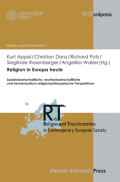This volume grows out of the interdisciplinary research programme ‹Religion and Transformation in Contemporary European Society› at the University of Vienna and is the first in what is envisaged as a series of publications under this title. Kurt Appel, in his introduction, sets out the basis on which the programme is proceeding, involving as it does some 20 researchers drawn from six faculties. Such an enterprise is difficult to put into operation without a thematic plan, hence the decision to create five broad categories within which individual pieces of research will focus: Critique of Religion and Conceptions of God, Religion as Inclusion and Exclusion, Juridical Challenges in Multi-religious Societies in Europe, Constructs of Meaning and Values in Europe and finally the Reception and Hermeneutics of Religious Texts. Accordingly, each theme is represented in this collection by two contributions, with the exception of the second, which has three. Four contributors write in English, the rest in German. Appropriately, colleagues from Vienna are strongly contributing but the scope of the programme is indicated by the participation of colleagues from Germany, Belgium, Denmark and Israel. The range of topics and contributors, their different methodological approaches and the ambition to speak of ‹Europe› means that this is not a volume which comes to any specific overall conclusion for a reviewer to evaluate. Each contributor, however, does normally attempt some kind of conclusion. The individual pieces are also normally subdivided into clear sections and have quite substantial guides to further reading in the relevant areas. One gets the sense, therefore, of ‹work in progress› in the diverse themes, not a set of ‹solutions› to some fascinating but intractable topics. Herbert Schnädelbach asks again about the fundamental nature of theology (and therefore its relation to ‹religious studies›). Christian Danz suspects that it might be necessary (and possible) to develop a normative concept of religion. Ferdinand Sutterlüty asks general questions, across the board, about boundaries within secular society while Sieglinde Rosenberger and Julia Mourão Permoser look specifically at Austria and examine the governance of diversity, particularly with reference to the Muslim population. Michael Minkenberg (in the only contribution with charts and statistical tables) argues that both the state and religious communities, in their different cultural contexts, have to renegotiate their relationship. Rik Torfs is preoccupied with rights (bringing a Low Countries perspective) arguing that they cannot be disconnected from the society in which they function. They do not necessarily have an intrinsic strength which offers protection in all circumstances. Richard Potz and Brigitte Schinkele are in the same territory but look in very specifically at current legal thinking about the particular implications of the European Convention on Human Rights in its bearing on religion. Herman Westerink challenges the great narratives of secularization and their alternatives, and proposes a focus on ‹Everyday Religion›: specific contexts and individual lives. Niels Christian Heidt looks at the search for meaning in discussing faith and health in secular Nordic countries, specifically Denmark, but believes that the field of research is marred with unclear concepts. In the final theme Rüdiger Lohlker looks at Islamic texts, arguing that hermeneutically they should be seen in a context of deterritorialization and reconfiguration. Finally, in his exposition of Jewish hermeneutics Paul Mandel sees a place having been always found, alongside the exposition of scripture as sacred text, for extra-textual traditions of both legal and nonlegal significance.
Such brief indications can only give a flavour of the contents. It will be evident that some have a very specific and territorial focus, others float serenely in speculative realms. Some give a sense of a general trend or tendency which might be judged ‹European› but a historian, such as this reviewer, will find little anchorage in particular ‹Europes›, from Ireland to Lithuania, in terms of ‹religion and transformation›. No contributor has the space to develop ‹the last word› on any topic but each either contributes to the ever elusive search for ‹conceptual clarity› or brings nuggets of valuable information on topics about which little has so far appeared in print, either in German or English. The volume as a whole does not ‹add up› in any specific way. Interdisciplinarity opens up fresh ways of looking at topics for practitioners perhaps hitherto locked into the assumptions and presuppositions of the disciplines in which they have believed themselves to exist. Any reader can see for herself or himself where connections might be made and crossfertilization occur but such conclusions can only flow individually. This volume stimulates this process, and is to be welcomed, but it does not, and cannot, tell us which, if any, of the many perspectives it incorporates should be regarded as hegemonic in seeking to understand ‹Religion in Europe today›.
Zitierweise:
Keith Robbins: Rezension zu: Kurt Appel/Christian Danz/Richard Potz/Sieglinde Rosenberger/Angelika Walser (Hg.), Religion in Europa heute: Sozialwissenschaftliche, rechtswissenschaftliche und hermeneutisch-religionsphilosophische Perspektiven, Göttingen Ku/Vienna, Vienna University Press, 2012. Zuerst erschienen in: Schweizerische Zeitschrift für Religions- und Kulturgeschichte, Vol. 106, 2012, S. 755-756.
